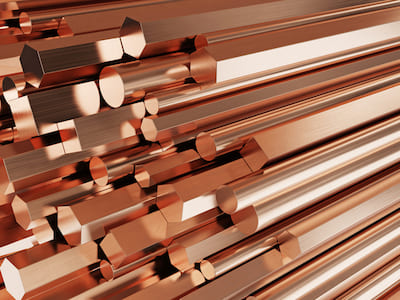Exploring the Diverse Applications of Copper Products in Modern Industries
From improving the effectiveness of electric systems to playing a critical function in sustainable power modern technologies, the versatility of copper is noticeable. As markets progressively focus on development and sustainability, the diverse applications of copper call for a closer assessment, especially concerning their possible influence on future environmental practices and technical improvements.
Electrical Applications of Copper
Copper is a crucial material in the electrical industry, accounting for around 60% of the overall need for non-ferrous metals internationally - Copper Products. Its premium electrical conductivity, which is nearly two times that of light weight aluminum, makes it the recommended choice for a variety of electrical applications. From circuitry systems in business and household structures to high-voltage power transmission lines, copper makes certain performance and integrity in electrical energy delivery
In enhancement to wiring, copper is indispensable to the production of electric parts such as generators, motors, and transformers. These components leverage copper's thermal conductivity and malleability, vital for warm dissipation and efficient performance. Copper's resistance to rust enhances the lifespan and longevity of electric systems, making it an economical option in the long term.
The growth of renewable resource sources, such as solar and wind power, has actually even more boosted the demand for copper in electrical applications. As industries shift towards sustainable power options, copper's role becomes even extra critical. In general, the convenience and efficiency attributes of copper solidify its condition as a keystone product within the electric market, driving technology and performance throughout various applications.
Pipes and Piping Solutions
In modern-day pipes systems, the choice of products dramatically impacts both functionality and long life. Copper has actually emerged as a preferred alternative as a result of its distinct homes, consisting of rust resistance and antimicrobial features. These features ensure that copper piping stays risk-free and long lasting for transporting safe and clean water, a critical consideration in household and commercial applications.
Among the crucial benefits of copper in pipes is its capability to endure heats and pressures, making it suitable for a variety of applications, from warm water systems to home heating and cooling networks. Furthermore, copper's adaptability permits for easier installment in complex piping layouts, decreasing the danger of failings and leakages.
Another noteworthy benefit is copper's long life-span, usually surpassing half a century with appropriate upkeep. This longevity not only reduces replacement costs but additionally adds to sustainable methods by lowering waste. Copper's recyclability aligns with modern environmental standards, advertising a round economic situation within the pipes sector.
Copper in Renewable Resource
The adaptability of copper extends beyond pipes applications, playing a vital function in the sustainable energy field. In solar panels, copper is made use of in solar cells and circuitry, assisting in reliable power conversion and transmission.

Moreover, as the international need for electric vehicles (EVs) boosts, copper's duty in battery systems and charging framework ends up being here are the findings also more significant. The product's capability to carry out electrical power effectively is integral to the performance of EV batteries, boosting variety and billing speed.
Copper's Role in Electronics
Electronics producing relies greatly on copper's phenomenal buildings, particularly its high electrical conductivity and thermal performance. These qualities make copper an excellent choice for a vast range of digital parts, including connectors, circuit boards, and wiring. The metal's ability to effectively send electrical signals makes sure very little energy loss, which is important in high-performance electronic gadgets.
In addition, copper's thermal conductivity plays a substantial role in warmth dissipation, safeguarding delicate parts from overheating. This is specifically vital in modern-day electronics, where compact designs cause boosted warm generation. Copper is also preferred for its pliability and ductility, allowing it to be conveniently formed right into complex styles that satisfy the needs of innovative electronic applications.
With the rise of customer electronics, telecoms, and electrical cars, the need for copper in the electronics sector continues to expand. Hence, copper stays a cornerstone material in the ever-expanding area of electronics.
Ingenious Uses in Manufacturing

One noteworthy application remains in additive manufacturing, where copper-based materials are utilized in 3D printing processes. This allows for the production of intricate geometries and light-weight parts, particularly in the aerospace and auto sectors. Furthermore, copper's thermal conductivity makes it an ideal choice for heat exchangers, boosting effectiveness in industrial cooling systems.
Moreover, the increase of wise production has seen the website link unification of copper in IoT tools, where its conductive capabilities sustain advanced noticing modern technologies. In the realm of sustainable power, copper is crucial in the production of photovoltaic panels and wind generators, assisting in extra reliable power conversion and distribution.
As industries make every effort for sustainability and innovation, copper's flexibility and efficiency proceed to position it as an important material, driving developments in manufacturing and adding to the growth of smarter, much more efficient products.
Conclusion
The important role of copper in sustainable power and its essential feature in electronics emphasize its significance in advancing sustainable practices. go now Jointly, these applications show copper's crucial contribution to technological progression and industrial effectiveness in contemporary culture.
From improving the efficiency of electric systems to playing a vital function in renewable power technologies, the versatility of copper is evident. As markets significantly focus on advancement and sustainability, the diverse applications of copper necessitate a closer assessment, especially regarding their possible impact on future environmental methods and technical developments.
The development of sustainable power sources, such as solar and wind power, has actually additionally raised the need for copper in electric applications. Overall, the convenience and efficiency characteristics of copper solidify its standing as a cornerstone product within the electric industry, driving development and effectiveness across numerous applications.
The flexibility of copper prolongs beyond pipes applications, playing an important duty in the eco-friendly energy field.